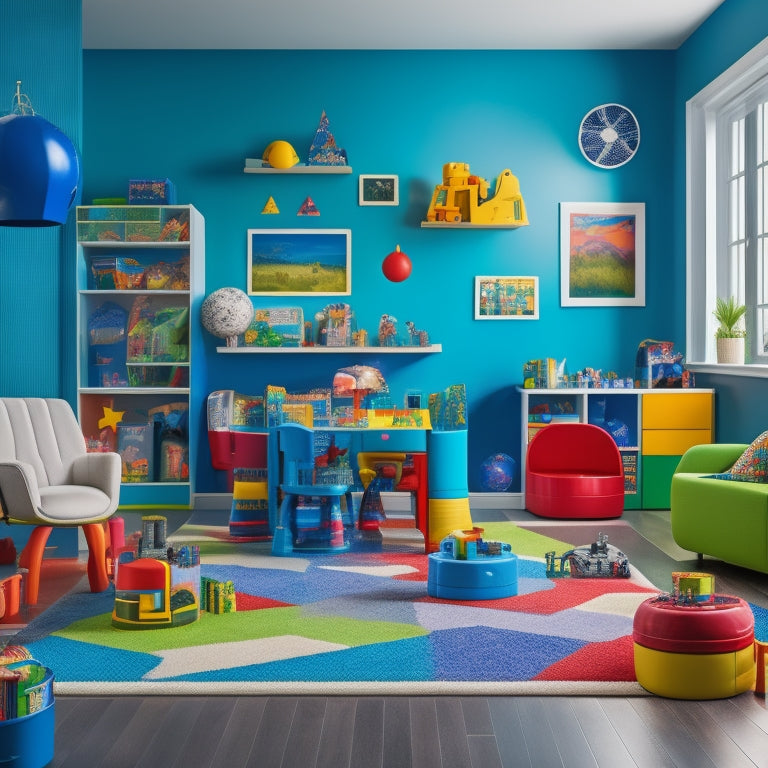
Interactive Toys Spark Kids' Learning Journey
Share
Interactive toys play a pivotal role in sparking kids' learning journey by fostering cognitive development, creativity, and critical thinking skills. They stimulate problem-solving, encourage self-directed learning, and lay the foundation for future academic success. Educational toys provide a platform for hands-on learning, catering to various learning outcomes and nurturing young minds. By integrating play with education, kids develop essential skills like attention, memory, and processing speed, and cultivate a lifelong love for learning. As children engage with interactive toys, they'll discover a world of exploration and discovery, and the possibilities are endless.
Key Takeaways
• Interactive toys enhance cognitive development in children by stimulating critical thinking, problem-solving, and creativity skills.
• Educational toys provide a platform for hands-on learning, exploring new concepts, and developing problem-solving skills, social intelligence, and academic performance.
• Playful moments with educational toys lead to valuable learning experiences, developing essential skills like problem-solving, critical thinking, and creativity.
• Interactive toys create a nurturing learning environment, encouraging exploration, self-discovery, and promoting problem-solving skills and critical thinking.
• Engaging educational toys spark imagination and creativity in young minds, laying a strong foundation for creative thinking and success in a fast-paced world.
Unlocking Cognitive Potential
Cognitive development in children is greatly enhanced through the use of interactive learning toys. These toys stimulate their minds and foster critical thinking, problem-solving, and creativity skills. They play a crucial role in brain development, shaping the foundation for future academic success.
By engaging with interactive toys, children can develop essential cognitive skills, such as attention, memory, and processing speed. This, in turn, enables them to think logically, make informed decisions, and approach complex problems with confidence.
Interactive learning toys offer a unique opportunity to access children's cognitive potential, empowering them to reach their full intellectual capacity and thrive in an increasingly competitive world.
Educational Toys for Curious Minds
Equipped with an innate sense of curiosity, children naturally seek to explore and understand the world around them, making educational toys an essential tool in fueling their intellectual growth and development. These toys provide a platform for kids to engage in hands-on learning, exploring new concepts, and developing essential skills.
| Benefits | Types of Toys | Learning Outcomes |
|---|---|---|
| Cognitive Development | Construction Blocks | Problem-Solving Skills |
| Social Intelligence | Music Toys | Creativity and Self-Expression |
| Academic Performance | Math and Science Toys | Basic Skills and Concepts |
Learning Through Playful Moments
As children play with educational toys, they set off on a journey of discovery, where playful moments transform into valuable learning experiences that foster a deeper understanding of the world around them. Through fun exploration and hands-on activities, kids develop essential skills, such as problem-solving, critical thinking, and creativity.
Interactive toys provide a platform for kids to engage in self-directed learning, encouraging them to explore, experiment, and learn at their own pace. By integrating play with education, children develop a love for learning that lasts a lifetime.
Nurturing Young Minds With Fun
Through a carefully curated selection of engaging educational toys, parents and educators can create an environment that nurtures young minds, fostering a love for learning that is both fun and sustainable.
By incorporating hands-on learning experiences, children are encouraged to explore and discover new concepts in a self-directed manner. Fun exploration becomes a catalyst for cognitive development, as kids engage with interactive toys that promote problem-solving skills and critical thinking.
This approach not only makes learning enjoyable but also helps build confidence and independence. By embracing fun exploration and hands-on learning, we can cultivate a lifelong love for learning in young minds, setting them up for future success.
Sparking Imagination and Creativity
Beyond fostering a love for learning, interactive toys can also play a pivotal role in sparking imagination and creativity in young minds, allowing children to express themselves in unique and innovative ways. These toys provide a creativity boost, encouraging imaginative play and exploration adventures that ignite a sense of wonder and curiosity.
Hands-on learning experiences, such as building blocks and art supplies, enable children to bring their ideas to life, developing problem-solving skills and critical thinking. By incorporating interactive toys into their playtime, children can develop a strong foundation for creative thinking, setting them up for success in an increasingly complex and fast-paced world.
Frequently Asked Questions
How Do I Choose the Right Educational Toy for My Child's Age?
When selecting an educational toy, consider age-appropriate options that align with your child's developmental stage, ensuring maximum developmental benefits. Research toys that cater to their unique needs, interests, and learning style to foster best growth and engagement.
Can Educational Toys Really Improve My Child's Academic Performance?
Research suggests that educational toys can improve academic performance, offering benefits like enhanced cognitive development and boosted confidence. However, effectiveness depends on choosing toys aligned with a child's learning style and needs, outweighing potential drawbacks like overreliance on technology.
Are STEM Toys Suitable for Kids Below the Age of 5?
In the domain of early childhood, STEM toys can be a catalyst for cognitive development, offering a foundation for future academic success. For kids below 5, play-based learning and hands-on activities in STEM toys foster curiosity, creativity, and problem-solving skills, laying the groundwork for a lifelong love of learning.
How Often Should I Rotate My Child's Educational Toys to Avoid Boredom?
To avoid toy burnout, rotate educational toys every 2-3 weeks to maintain novelty and curiosity. This frequency guarantees benefits of variety, keeping kids engaged and motivated, while preventing boredom and stagnation.
Can Interactive Toys Help Kids With Special Needs or Learning Disabilities?
Children with special needs or learning disabilities can greatly benefit from interactive toys, which offer a multisensory experience, fostering cognitive development and therapy benefits through play, thereby enhancing their overall learning experience.